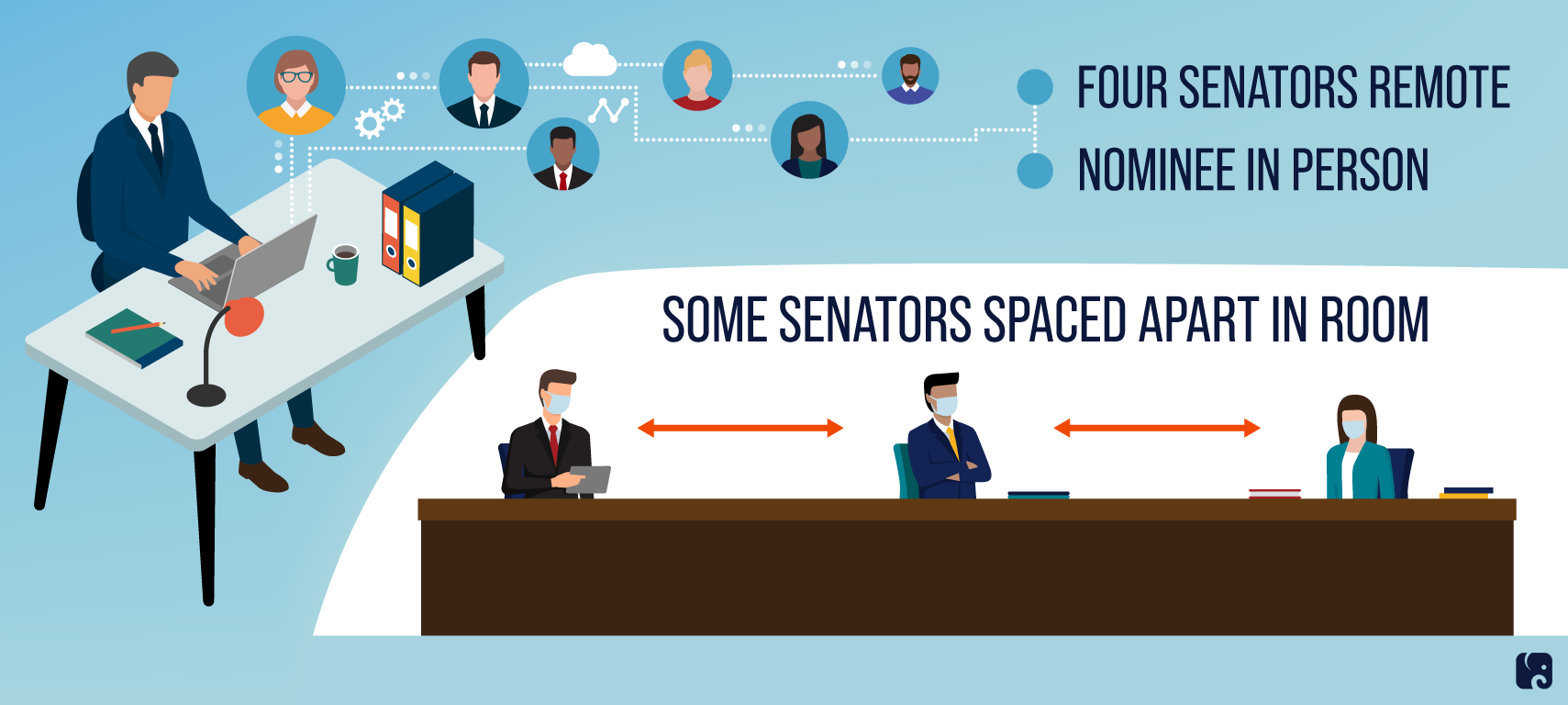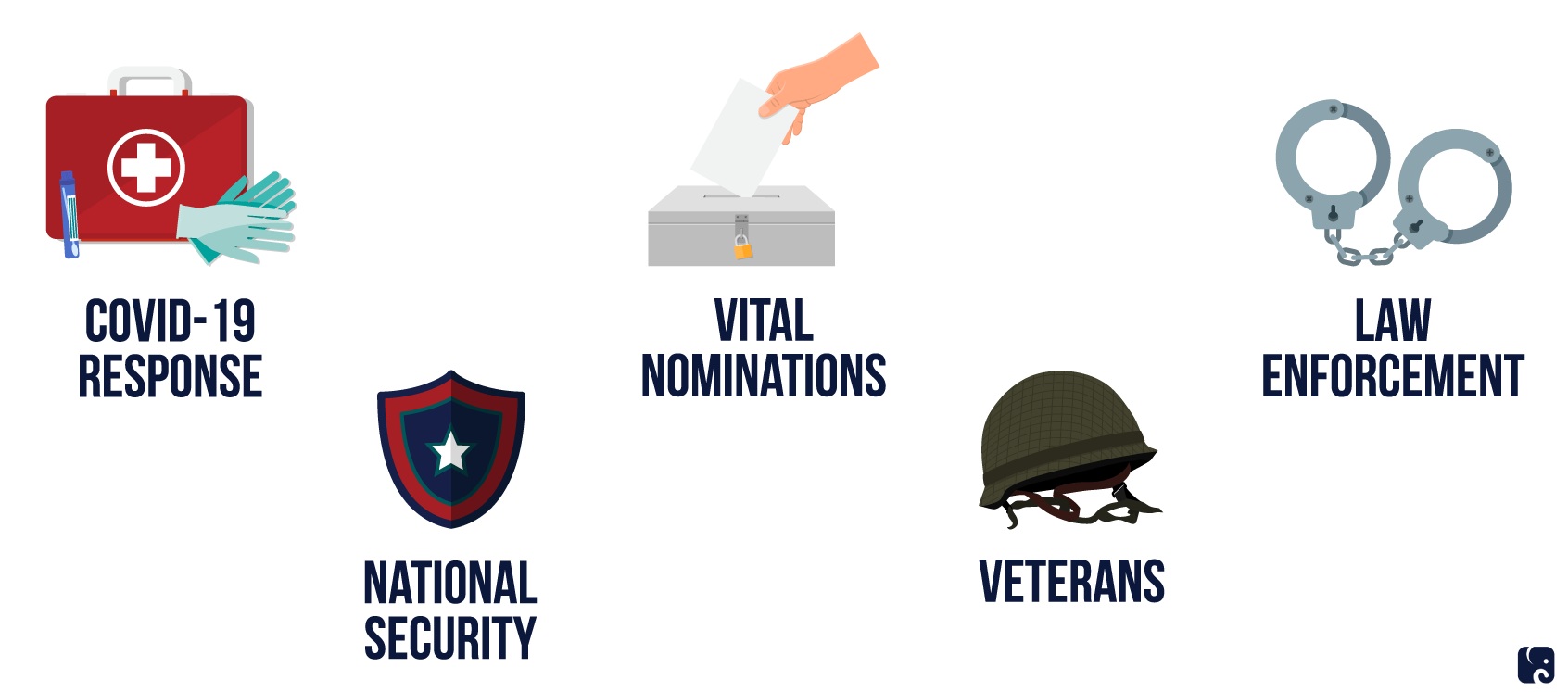A Successful Record of Remote and Hybrid Hearings
KEY TAKEAWAYS
- The Senate moved quickly in response to the coronavirus pandemic to implement procedures and technology that enable committees to continue their important work while ensuring that senators, staff, and witnesses are safe.
- Since May, Senate committees have successfully held 150 hybrid or remote hearings in which some or all senators and witnesses participated remotely without any significant problems.
- The committees met to conduct oversight of coronavirus response efforts; advance COVID-19 related legislation; examine police use of force in community relations; and consider critical national security issues and nominees.
As the country continues to respond to the coronavirus pandemic, the Senate must fulfill its constitutional duties. Committees are essential to how the Senate gathers information, considers legislation, conducts oversight, and confirms nominees. In May, the Senate implemented procedures and technology to enable committees to continue their important work while ensuring that senators, staff, and witnesses are safe. The Senate has been effectively completing its work aided by remote hearings over the last five months.
Senate Hearings Since May

five months of Senate hearing activity
The Senate held 150 hybrid or remote hearings from the beginning of May to the beginning of October: 25 were remote, in which everyone involved participated from locations outside the committee room; 125 were hybrid, in which some people were present in the committee room and others participated remotely. Nomination hearings accounted for 29 of the hearings, with 95 nominees considered.
senate COMMITTEES go remote
The Rules Committee, the Office of the Attending Physician, and the sergeant at arms established procedures to enable committees to use technology such as video conferencing that enables witnesses and senators in different locations to see, hear, and respond to one another securely and efficiently. The press and public could watch via livestream on the internet. Members who met in the committee room in person followed physical distancing guidelines; staff and public attendance were limited; and the committees increased cleaning measures. These procedures allowed committees to continue their work without significant problems and set the pattern for how they can continue operating as long as the pandemic persists. Without these measures, vital Senate business would have been stalled indefinitely.
Remote/Hybrid Activities in the Senate
committees conducting important business
Senate Committees have been going about the nation’s business. The Judiciary Committee alone has held 21 hybrid hearings since May, six of them on nominations.
Hybrid and remote committee hearings held in May included: a Health, Education, Labor, and Pensions Committee hearing on COVID-19 and steps to get safely back to work; and a Banking, Housing, and Urban Affairs Committee hearing where the committee got an update on implementation of the Coronavirus Aid, Relief, and Economic Security Act from Treasury Secretary Steven Mnuchin and Fed Chairman Jerome Powell.
June hybrid hearings included: Homeland Security and Governmental Affairs Committee hearings on the federal government’s strategies for procuring and delivering critical medical equipment and supplies in response to the pandemic, and the role of the strategic national stockpile; and Judiciary Committee hearings on efforts law enforcement is taking to fight fraud during the pandemic, and police use of force in community relations.
In July, hybrid hearings included: a Committee on Veterans Affairs hearing examining challenges the VA faces in delivering telehealth to rural communities; a Commerce Committee hearing examining ways to protect the public from COVID-19 related scams; a Rules Committee hearing on preparations for the 2020 election; and an Armed Services Committee hearing considering nominees to be the commanders of North American Aerospace Defense Command and United States Space Command. A Banking subcommittee held a completely remote hearing examining ways to win the global economic competition with China.
Hybrid hearings in August included: a Committee on Energy and Natural Resources hearing examining government and industry efforts to improve cybersecurity in the energy sector; and an Armed Services hearing examining the findings and recommendations of the Cyberspace Solarium.
In September, hybrid hearings included: a Veterans Committee legislative hearing on S.785, a bipartisan bill aimed at improving mental health care services for veterans; and Foreign Relations Committee hearings examining U.S. policy in a changing Middle East and ways to counter China in the Indo-Pacific and beyond.
Key Hybrid and Remote Hearings
May 20 Judiciary Hybrid Hearing

case study: Judiciary confirmation hearing
A May 20 Judiciary Committee hearing examining the nomination of Cory T. Wilson to be a judge on the 5th U.S. Circuit Court of Appeals provides a case study of the steps committees have taken to function safely during the pandemic. Senators who attended in person followed social distancing guidelines. Senators Sheldon Whitehouse, Marsha Blackburn, Cory Booker, and Mazie Hirono participated remotely. Judge Wilson testified in person. The committee was able to use the new procedures to exercise its constitutional role of providing advice and consent on a presidential nominee to the federal courts.
Next Article Previous Article


